Acer Chromebook 13: 1080p with Tegra K1
by Jarred Walton on January 23, 2015 10:00 AM ESTBattery Life
Battery life ends up being one of the highlights of the Chromebook experience, as the lightweight OS does well in both our Internet test along with our heavier 720p H.264 video looping test. If you’re looking for an inexpensive laptop that can go all day without plugging in, the Chromebook 13 is definitely an option. As with all of our battery life testing, we set the brightness of the display to ~200 nits and run until the device shuts off.
I do want to note before we get to the results that we are not using the same Internet test that we use on Windows laptops in our “Light” battery life test – that uses Internet Explorer for one, and it cycles through more complex web pages and tends to be a bit heavier in terms of processing requirements compared to our smartphone and tablet test, which is what we also run on Chromebooks. Our video test uses the same video (a 720p 4Mbit MP4 file) as our table video test, which is a lot lighter than our "Heavy" Windows laptop test where we’re loading web pages and downloading at 8Mbps in the background.
It might be interesting at some point to see how a modern Windows laptop manages with these same workloads, or to try replicating our heavier workloads on a Chromebook, but for now let’s just look at the results.
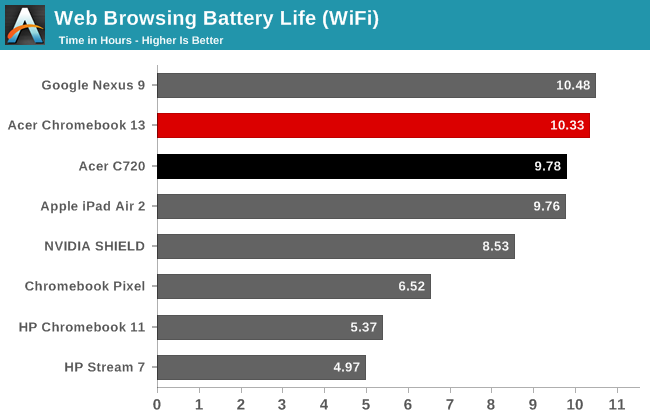
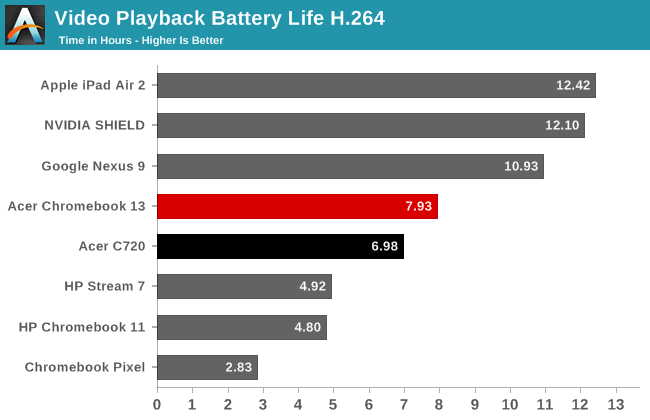
Over ten hours of battery life for web surfing is certainly nothing to scoff at, but perhaps more surprising is the nearly eight hours of video playback. Our earlier Chromebooks didn't do nearly as well, but both the C720 and the Chromebook 13 are able to hit 7+ hours of video playback. We’re still not able to match the battery life of most tablets for video playback, but compared to the old HP Chromebook 11 and the Chromebook Pixel things have obviously improved a lot.
LCD Quality
While performance was perhaps suspect with the Tegra K1 processor, where the Chromebook 13 really lets me down is in the LCD quality. I’m used to seeing a lot of poor quality 1366x768 TN panels in budget laptops, but when Acer chose to offer a 1080p display I hoped for something better. Unfortunately, the only upgraded aspect is the resolution, and the graininess and poor viewing angles at times make the display almost worse than a lower resolution panel. As you would expect, the color quality and accuracy also leave much to be desired.
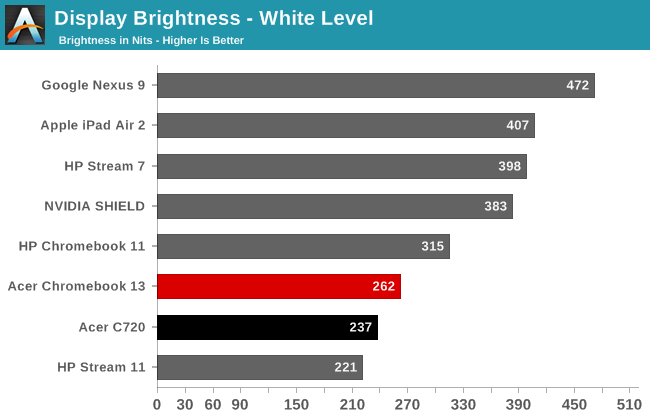
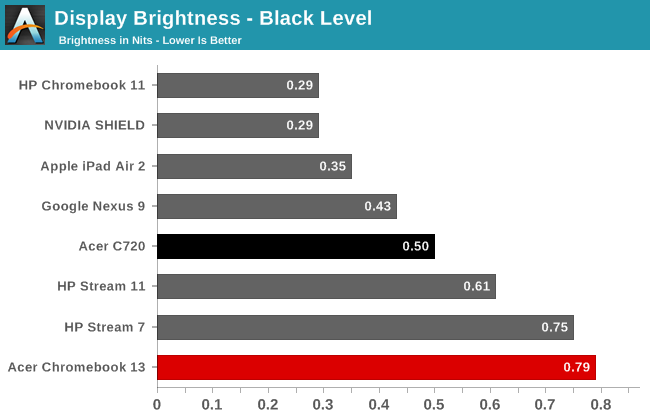
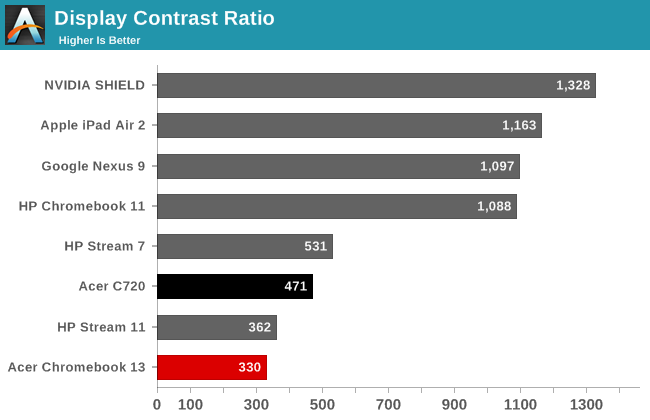
Right from the start we see problems with the display. The maximum white level of 262 nits isn’t horrible, but the corresponding black level of 0.79 nits is more of a dark grey than a black, and the resulting contrast is a rather poor 330:1 at best. And I say “at best” because at lower intensities the contrast drops further, e.g. when set for 200 nits we measured a black level of 0.67, giving us a 298:1 contrast ratio (and at 100 nits the contrast is only 65:1).
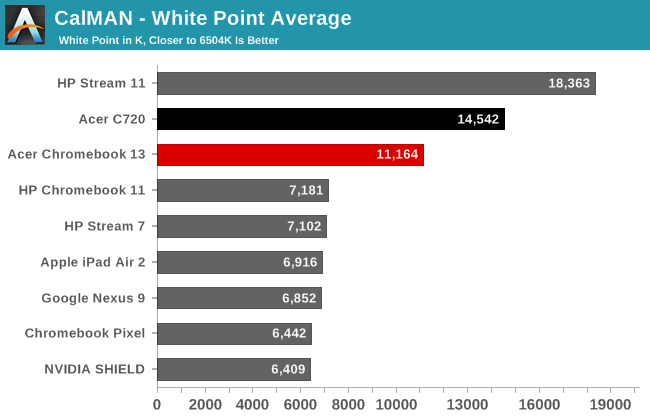
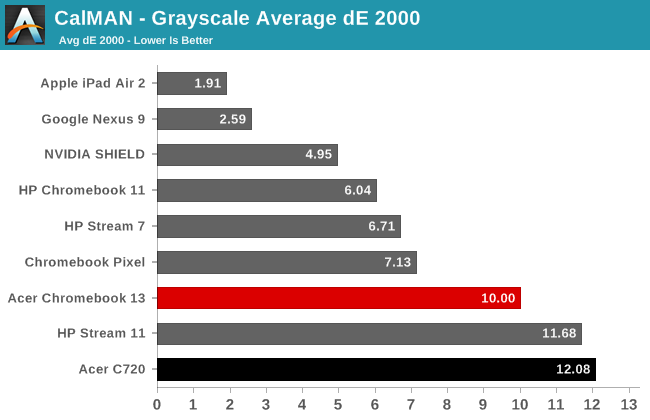
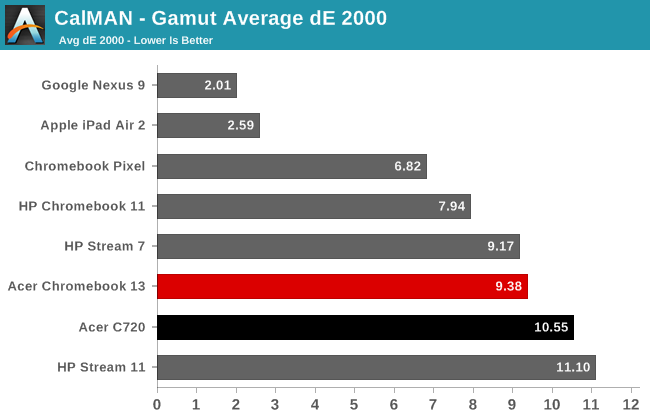
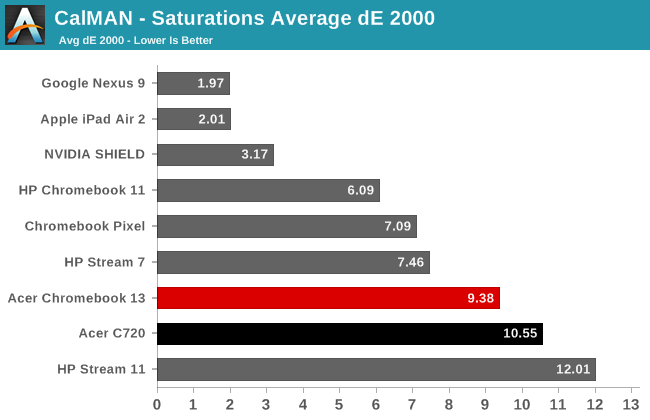
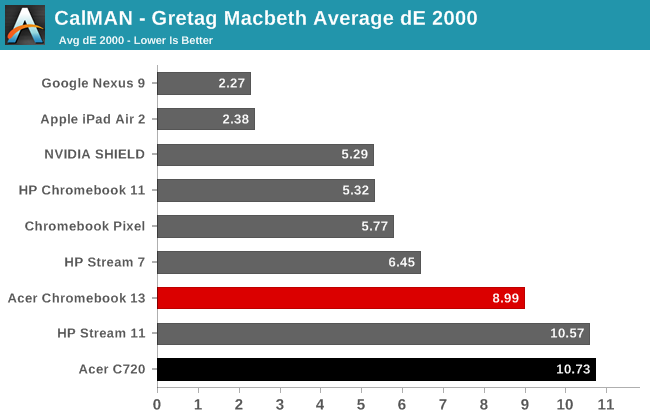
Things don’t improve as we move to other areas. The white point is crazy high at 11164K, though not at the level of the HP Stream 11 (thank goodness) and the result is that the screen – whites/greys in particular – has a clear “cool” blue tint. Delta E results across the whole set of tests are generally at or above 9.0 averages, which means the errors are very clearly visible to the naked eye. Here’s what the comparison charts look like for what you see vs. what you should see:
In this sense, it’s almost the reverse of the last Chromebook we reviewed, the HP CB11, where we found a good display (relatively speaking) but other areas needed work. The C720 display is another good point of comparison here: it has worse maximum brightness and colors are even less accurate, but the contrast ratio is slightly better at 471:1. As I said earlier, it’s like one step forward in resolution, but a step laterally or even backwards in other areas.
We can almost excuse the poor display as the Chromebook 13 is a budget laptop, and while there are plenty of Chromebooks around the $250 price point, the only current option that has a good display (other than the too-expensive Pixel) is Toshiba’s Chromebook 2 with a 1080p IPS panel. At $100 more for the Toshiba it’s unfortunately going to be a tough pill to swallow. Again, Acer seems to have learned a lesson here with upgraded displays as the forthcoming CB15 1080p uses an IPS panel. We should have both the Toshiba CB2 and the Acer CB15 in for testing shortly, so I can see how the two truly stack up in other areas, but for now if you like high quality displays just know that this particular 1080p panel falls well short of that mark. Not that my mom would likely notice the difference unless I pointed it out, of course….


_thumb.jpg)
_thumb.jpg)
_thumb.jpg)
_thumb.jpg)
_thumb.jpg)











71 Comments
View All Comments
lefty2 - Friday, January 23, 2015 - link
Beware, Haswell and Broadwell Chromebooks are being subsidised by Intel, but the subsidy is only tempory. As soon as Intel corners the market the subsidy will disappear and they will be replaced with cheaper Bay Trail chips:http://techtainian.com/news/2014/6/1/intel-is-subs...
is a strategy by Intel to make
JarredWalton - Friday, January 23, 2015 - link
Intel subsidizes a lot of things by offering chips at discounted prices. You'll note that the article talks about Haswell Celeron chips being subsidized by Intel, and yet here we are with a Broadwell Chromebook six months after that article was written. And yes, a lot of Chromebooks in the meantime used Bay Trail.Celerons are used in other laptops besides Chromebooks, but where the limited RAM and other cut corners are a problem on Windows that's not generally the case with Chrome OS. Intel may have dropped the price of the Celeron chips $50 to get into things like the C720, but as I've just shown with the benchmarks, C720 at $249 (i.e. unsubsidized) would hardly be a bad option.
Long term, we'll have to see what's available and the pricing -- and we still don't have a clear idea how much the 1080p IPS Chromebook 15 from Acer will cost. But if they can get that out at $299, it's guaranteed to win a ton of awards. At $349, it ends up more like the Toshiba Chromebook 2: lovely display, but $349 for a Chromebook is getting to be a bit high in pricing.
errorr - Sunday, January 25, 2015 - link
of course what you suggest is illegal as well...
savagemike - Friday, January 23, 2015 - link
Doesn't Toshiba offer a 13 model with an IPS display? I think it only has a baytrail though.One great thing about ChromeOS you didn't mention was the upgrade paradigm/procedure. It takes literally 10 seconds or so to upgrade my Chromebook. Compared to the hours of my life I've spent tapping my fingers and waiting for Windows to cycle through installing updates it's a breath of very fresh air.
I would actually say a Chromebook does 100% of what 'most' people want. I think you'd only have to look at some simple numbers to see that 'most' Windows computer users aren't in fact running Photoshop or high end games or anything like that. And the Windows machines available at these same prices would not be a good choice for those activities at any rate.
Most computer users are surfing the web, doing some e-mail and facebook and that's about it.
I see a lot of comments about needing Windows to do 'real work'. This usually referring to MS Office I suppose. A lot of businesses run using Google Docs though. And I'm sure their work is just as 'real' to them. So I don't really get such notions. You can do plenty of 'real work' on a Chromebook, depending on what your work is. There certainly isn't anything stopping you from doing school work or running a business or writing the great American novel on one.
I'm interested to see what Google does with ChromeOS going forward. Frankly I think the answer lies in the massive uptake of containerization going on in the Linux community.
It would be very easy for Google to take advantage of the wide range of powerful Linux apps while still maintaining the high security and ease-of-use of Chromebooks if they implemented some type of Docker type container mechanism into the heart of it.
JarredWalton - Friday, January 23, 2015 - link
Yes, I mentioned the Toshiba CB2 with 1080p IPS a couple times. As for the "100% of what most people want"... no, I don't believe that at all. It's 100% of what some people do, sure, but even my non-techie wife ran into limitations pretty quickly when I had her use a Chromebook. Some of it was due to differences in how you use the laptop (where are my files kind of stuff), and she could live with the platform if necessary, but there are lots of small things that can get missed. Maybe it's 99% of what most people need, but that 1% can still be too much if it's an important item (e.g. a bank site that doesn't work properly with Chrome, though that's rare these days).savagemike - Friday, January 23, 2015 - link
Use certainly depends on ... well... use. But of the handful of friends and family I help out with computer stuff most only need to know anything about the file system ever to download and install applications. Typically a browser or virus program or flash plugin installer and the like. Most of that stuff goes away with ChromeOS. For the little that's left I don't find using the file system any worse than explaining how to use a traditional file system to them.But yes, certain people will have certain needs or uses which either wouldn't work or would require learning a new routine.
AmdInside - Sunday, January 25, 2015 - link
Agreed. When patch Tuesday is here and I see an update to .Net I cringe cause those are the slowest updates, even with Windows installed on an SSD.harrynsally - Friday, January 23, 2015 - link
I'm not digging Chromebook's power / functionality / utility.I just purchased a Dell laptop with 15.6" touch screen, Intel Haswell core i3, 4GB RAM, 500GB HDD, DVD, HDMI, USB 3.0 & 2 x USB 2.0, 6 cell battery etc. for $299. For less than $100 replaced the HDD with a Samsung 250 GB 850 EVO SSD,
OK, it came with Win 8.1 OS. I've been using Windows since it first came out (e.g. 3.1, 95, XP, 7) and have yet to have a malware issue. I set it up to boot to desktop mode (e.g. have a Android tablet for touch apps) and find the Win 8.1 experience comparable to Win 7 and sometimes better. Additionally, MS just announced that they will provide a free upgrade to Win 10 (to users of Win 7 and 8.1).
I find the ability to easily choose/ add upgraded components, run applications and have productivity independent of the cloud, USB / HDMI connectivity and much higher performance for just a few $ more, a no brainer.
On a budget? My daughter just purchased a ASUS laptop with 15.6" screen, Intel 2.16GHz N2830, 4GB RAM, 500GB HDD, HDMI, USB 3.0 & USB 2.0 and Win 8.1 BING for $219.
JarredWalton - Friday, January 23, 2015 - link
I don't know when the last time is I actually got hit by malware/virus on one of my PCs. But I have friends and family I help who are not as savvy that get malware ALL. THE. TIME. It's crazy to me -- like a person will have a system for less than two weeks, and it has malware (that happened with my dad just this past month). I'd blame porn sites for some users, but that's not even the problem on some of these systems. It's looking for "free [anything]" and going to the wrong web sites, or searching for a web site in Bing instead of typing in the URL (that's what got my dad I'm pretty sure).I'd love to say the solution is user education, but that just doesn't work. Get yourself a bunch of friends or relatives with children 8+ years old who are allowed to use the PC on a daily basis and I guarantee some of them will get hit with malware within a month. I tend to fix at least 20 computers a year where the only problem is that they got hit by malware. Thankfully, most of them aren't as bad as Cryptowall, which wiped out my dad's desktop and is asking for a $2000 ransom. (And that was with Norton AV running.)
BackInAction - Friday, January 23, 2015 - link
@JarredWalton: I hear you loud and clear! My father gets stuff on his machine within days after I clean it. I dread going home. I just can't protect him enough from his stupid habits. In his case, I think is 'gun' sites. And randomly clicking on anything that pop-ups up in his face.While my kids were young it wasn't much of a problem. Now that they are older it is crazy ("gee I can get free music, or the latest episodes of Teen Ware-wolf before it is on Netflix, from this site, all I have to do is download this .exe." Doh!). I had to remove their admin rights. It is a bit of pain now and then, but it was the only way I could keep sane.
That said, I have a Chromebook (13" Toshiba for $180 last fall) and they all fight for it. I don't care what they do on that thing. I can wipe and rebuild it in 15 min if needed.